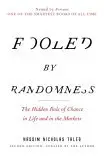Enlightened By Randomness
Weeks ago I read the book Fooled by Randomness. Besides the interesting stories on financial trading and risk management, the core message of the book is the fallibility of human knowledge. The fallacies that we often make are:
1. Overly associative. As my favorite quote in the book states, “Symbolism is the child of our inability and unwillingness to accept randomness.” We human like to assign meanings to anything, even when there are none. Religious people look at a Jesus-looking cloud and think it is a sign from God. Literature students discuss about symbolisms they find in books that the authors haven’t even thought about. In quality management, W. Edwards Deming noted that managers panic over common causes of variation which are just noises in the business process. Managers see a drop in revenue and demand explanation when in fact it is just a random event.
2. Survivorship Bias. We tend to see things that are special cases and mistake them as the norm. For example, newspapers report violences everyday. We read them and think that we are living in a horrible world. In a TED talk by Steven Pinker, he objectively analyzes historical data of violence and find that we are now living in the most peaceful time of human history. We read The Millionaire Next Door and think that education is not important to getting rich. It is true that highschool dropouts can be successful, but that does not mean they have the same chance to succeed as a college graduate.
3. Abnormal Distribution. Every process have a distribution of its outcomes. Fat tails in financial markets are common. If you have 99% chance of winning $1 and 1% chance of losing $100, the odds are against you even if you are to win 99% of the time.
4. Other Monte Carlo paths. In studying history and past events, people tend to judge a decision base on what happened instead of what could have happened. If a manager spends $1000 and wins a lottary that pays $1,000,000 when the odds of winning is 1 in 1,000,000, he is likely to get promoted for “making a smart move” or “taking some good risk” instead of getting fired for making a stupid bet.
